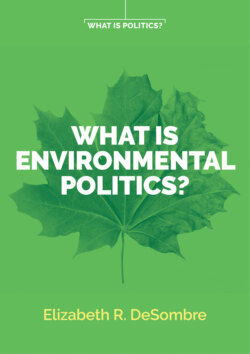Читать книгу What is Environmental Politics? - Elizabeth R. DeSombre - Страница 11
Common Pool Resources
ОглавлениеThe characteristic of environmental issues that makes collective action problems especially difficult is that they are common pool resources (CPR; some economists call them common property resources). These types of issues share two qualities. The first is non-excludability. People cannot be kept from accessing the resources – say, the fish in a lake or the air into which pollution is emitted. Because of that lack of excludability, almost anyone can contribute to the creation of environmental problems. The effects are also widely shared, and so are the benefits of preventing or fixing the problems – if air pollution is cleaned up, everyone who breathes the air benefits. This aspect is the central one to the creation of collective action problems, discussed above, and can make it difficult to collaborate to solve them.
The second quality causes additional problems: CPRs are what is sometimes called “subtractable” (and sometimes called “rival”). That means that one person’s use of a resource (or contribution of pollution to a resource) can make that resource less useful for others. The factory that puts pollution into the air makes the air dirtier for others who want to breathe it. The fisher who takes fish from the ocean leaves fewer fish behind to reproduce or to be caught by others. That is part of what causes the environmental problem in the first place, but the most important aspect of subtractability is that it makes addressing the problem especially difficult. If most factories stop putting pollution into the air but one or two of them don’t, those factories can still decrease the quality of the air. If most who are fishing agree to fish less, those who do not change their behavior can simply catch more of the fish that remain. In other words, free-riders don’t just make it harder to cooperate (because you know that not everyone is bearing their fair share of the effort to solve a problem), they actively undermine the ability of others to address the problem. In some cases, free-riders can make solving the problem impossible.
Subtractability is a characteristic of common pool resources that other types of public goods problems (such as the operation of lighthouses to warn ships of hazards or the creation of public broadcasting systems) don’t have, and that can therefore make them harder to address cooperatively. This logic, again, supports the need for political solutions to environmental problems. Mandating or prohibiting action by all relevant contributors to a problem can be important, since free-riders can undermine any collective solution. But it can be difficult to find political solutions when they would be costly for some of those who would be regulated.
